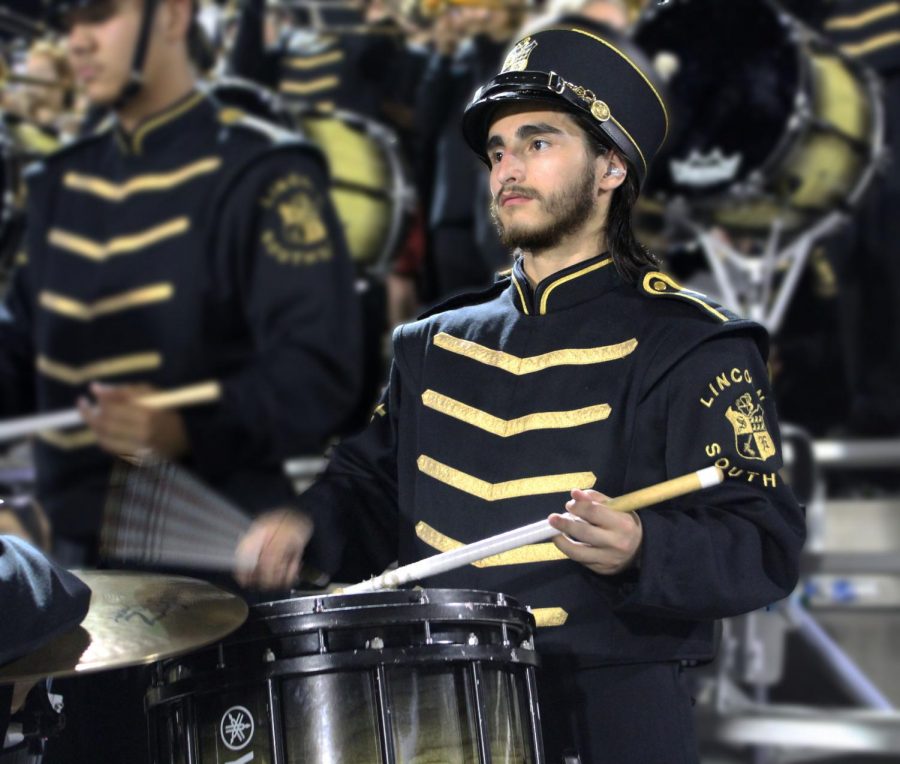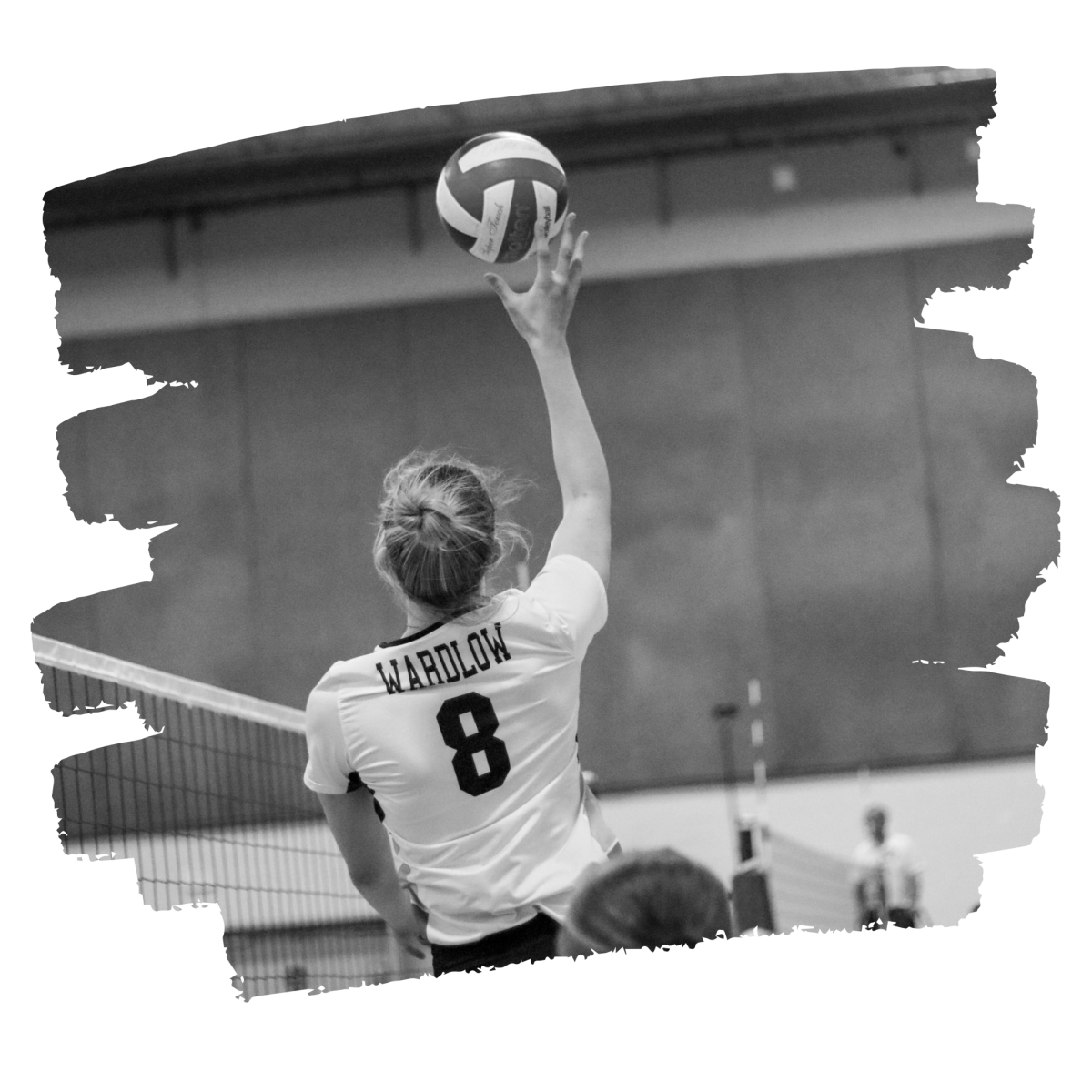HeartBeat: Finding family in Drumline
The Family Inside of Drumline
November 13, 2018
A single tap-off is only the beginning of what the audience sees of drumline, along with a few cadences in the stands and an eight minute half-time show. What most people don’t get to experience is the family formed between members of this group who share passion for drumming. No matter what sparked their first love for the music, they’ve all joined together to play with their heart to the beat.
Drumline consists of three different drum sections:bass, tenor and snare. Each have different personalities, but all are full of energy. At spring tryouts, the drummers write down their personal order of preference between the three sections, and are then placed based off of how well they can play. Drumline director, Gary Shuda, tries to match them up with their preferences, but also has to do what’s best for the group.
Along with tryouts in the spring, members also have the opportunity to apply for a section leader position. This is an extra step that not everyone chooses to take, but in the end it is very rewarding.
“I like that I have a part in the band that helps everyone out,” junior Renna Fielder (bass) said.
After section leaders are chosen throughout the band, these students are required to undergo a training session before summer officially starts. During this presentation, the leaders learn how to improve their attitudes towards marching band, as well as realize the importance of personal responsibility and integrity.
“You have to stay positive and make sure you keep the energy going,” senior Caleb Baker (tenor) said. “It’s kind of your responsibility.”
Band directors have a lot of other obligations during practices and performances, and they aren’t always available when situations arise. “You have to understand how to deal with problems,” Fielder said. “[Section leaders] have to take criticism as well as give it.”
However, even if members do not have the title of section leader, they have found that they can still help their peers out. Senior Josh Howard is always willing to help out a younger member who might be struggling. “Have faith in yourself,” Howard said, referring to freshmen. “Don’t get down on yourself.” But sometimes words aren’t enough when everything becomes a little too overwhelming for new members. “I’ll show them what to do, and I’ll play alongside them,” Howard said.
After a summer of long practices, the positivity begins to fade as band camp unravels. Every year, freshmen find it hard to continue on through the enduring work, but drumline always keeps up the tradition of engaging the group in exciting activities.
“We always go to Freddy’s on the first Friday of band camp,” Baker said. “It’s a good way to get to know everyone including the freshmen.”
Drumline serves as the alarm clock for most neighbors around Southeast as their practice begins seconds after 7 a.m. on weekday mornings. Drumline is followed by the marching band, directed by Richard Metteer. Starting the band up is usually enough to arouse sleepy neighbors.
Besides the usual weekly morning practices, drumline rehearses every Thursday, for a couple hours, working on cadences, show music, basic warm-up sequences and stand songs.
During all of this hard work, practices can easily become stressful and difficult for people to keep up with. “We try not to keep everything too serious, even when we’re trying to focus,” Fielder said. “Before a rep, people are cracking jokes at each other.”
Outside of practice and band camp, the group finds time to hang out and always makes sure to include everyone. In doing so, they hang out in both their individual sections, and as a whole. It’s a great way to get to know everyone more individually and understand what might be going on outside of practice.
“Drumline is like another family,” Howard said. “I know you hear that a lot about a bunch of other activities. But we really are so close, we love each other. We really lean on each other, and we’re always looking out for each other. I really appreciate that.”
Drumline’s success lies within the members, as a band is only as good as its weakest member, and it requires hard work from all of the members.
“[A huge positive is] when we’re playing and it finally all comes together,” Baker said. “That’s a really good feeling.”
How does drumline keep everyone motivated on the harder days? “We [play] pranks on each other,” Baker said. “It’s a lot of fun.” Although they are always a tight and caring group, they aren’t afraid of pulling out a little trickery on each other if it creates smiles.
At football games, drumline continues their pre-halftime traditions including pep talks and chants. To an outsider, the dances and jokes may seem absurd, but they bring pep to the group before powering through the show.
However, it’s essential for each member to have the self-motivation to continue on. “I kind of get down on myself, but I know I’m just having an off-day,” Howard said. “[I know] I can do better than that, and I will do better than this.” Not every day is going to go exactly according to schedule, and will likely become overwhelming. They just have to believe in themselves and look towards their friends.
Football games are a thrilling place for competitions between the two teams, but also for the drumlines. In these riff-off type settings, the drumline starts off with a single beat, and the opposite responds with two. This continues on to see how high they can get until the other can’t continue. “We will always win, there’s no school that will ever beat us,” Baker said. Sometimes, though, it’s hard to start when people aren’t paying attention, and other schools don’t always respond to the call. Drumline stays positive however and is always looking to improve their score.
Drumline always ends a cadence series with their popular “One-Hit-Wonder” for their finale. While it’s just a single beat, it’s very precise between all the members. It takes practice to ensure that they close a great series with a bang.
The marching band season must come to an end as concert band approaches. Split up into three bands; concert, symphonic and wind ensemble, percussion still continues their close connections. “We don’t see each other as often, but we still care and talk to each other,” Howard said.
The atmosphere changes greatly between marching band and concert band. “It’s much softer,” Howard said. “You also have to be more precise and accurate in concert band.” The focus intensifies as the members switch off instruments for each song, giving them a new perspective. Instead of learning just your particular drum, you may be playing cymbals, marimba, vibes or timpani.
Last school-year, some percussionists also got together to perform “Stool Pigeons” in the winter “Nite of Knights” performances. This glow-in-the-dark, drumstick-tossing wooden-stool playing performance was a personal favorite of the audience as they cheered on the group. It’ll be hard to top, but the group is considering trying out again this year. Any chance the drummers of Southeast can show up to get the crowd pumped, they’re sure to bring a new zest.








